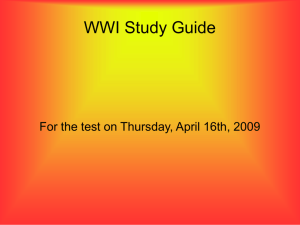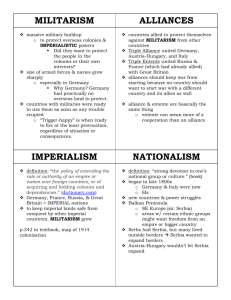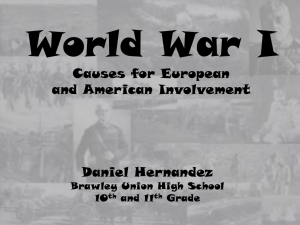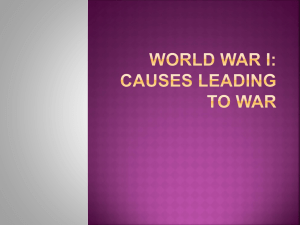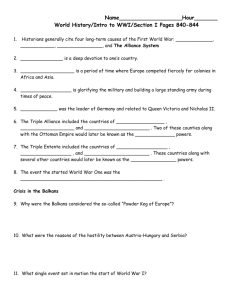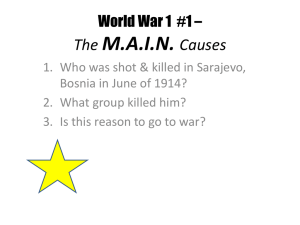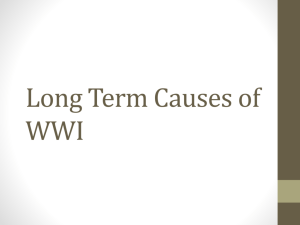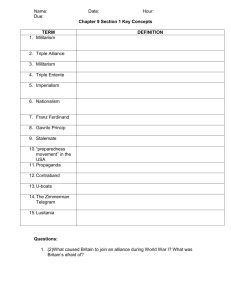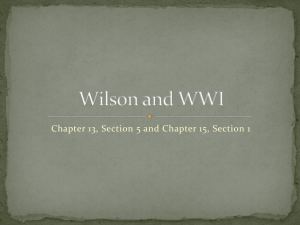WWI Causes: Militarism, Alliances, Imperialism, Nationalism
advertisement
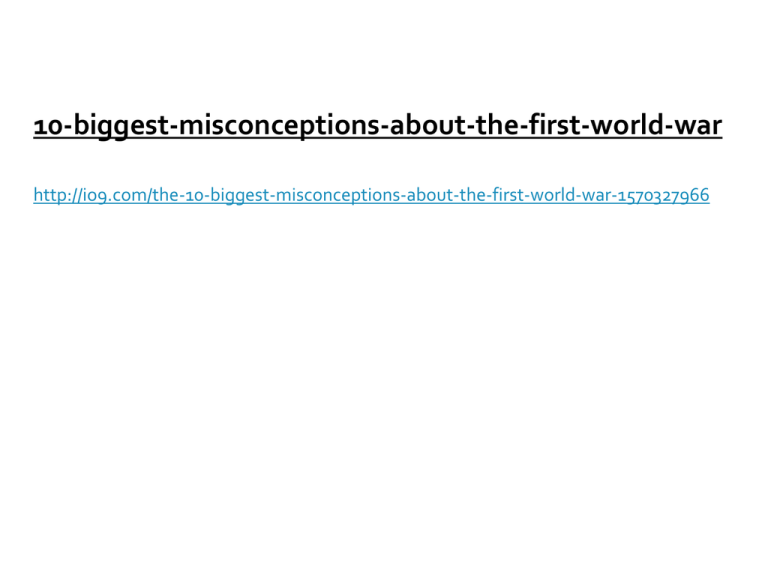
10-biggest-misconceptions-about-the-first-world-war http://io9.com/the-10-biggest-misconceptions-about-the-first-world-war-1570327966 Review with your partner last night’s homework—Europe Moves Towards War Packet [3 minutes] Highlight/Underline the most important sentence in each st paragraph on the 1 page. [3 minutes] Objective: I can summarize the causes of World War I, which included militarism, alliances, imperialism, and nationalism. Militarism-a policy of glorifying military power and keeping a standing army always prepared for war. Great Britain and Germany raced to have the largest navies. France, Russia, and Germany competed in building powerful armies. Alliances-the formation of military agreements among nations. Germany, Austria-Hungary, and Italy formed the Triple Alliance in 1882. Great Britain, France, and Russia formed the Triple Entente in 1907. Imperialism-a nation’s attempt to gain control of weaker nations. European nations divided much of Africa into colonies in order to obtain new materials and sell goods. European nations forced China to grant them trading rights. Nationalism-extreme loyalty to a nation and concern for its welfare. National groups in Austria-Hungary and the Ottoman Empire (Turkey) wanted independence. European nations sought to regain lost territories and/or add land. List the four MAIN causes of WWI. What is militarism? Who is the in the Triple Alliance and Triple Entente? What is imperialism? What is nationalism? Militarism Create a poster. Include all four MAIN causes of WWI. Include imagery to describe the definition of each cause. Be Creative!!! ***Due Thursday!!!*** 16 Points Alliances Imperialism Nationalism Nationalism led nations to compete over which would be the strongest military power in the world The glorification of military power is known as militarism. The strongest nations of Europe began to prepare for the possibility of war. Increased the size of their armies and navies and greatly increased stockpiles of weapons Advancements in industrial technology allowed them to create weapons of war that were deadlier than any that had been developed before War looked inevitable European nations looked for friends and allies for support Two great alliance systems were formed. Triple Alliance: Germany, Austria-Hungary, and Italy Triple Entente: Great Britain, France, and Russia Each alliance signed agreements with smaller, less powerful nations Defensive in nature If one member of an alliance were attacked, an ally was obligated to come to its aid Several nations might become part of a fight that formerly might have been limited to only two nations Grey=Neutral Countries Europe competed for colonies in Africa, Asia, and other parts of the world Colonies provided raw materials Desire for colonies aggravated national rivalries in Europe Disagreements sometimes led to conflict Desire for Self-Rule Russian, Austro-Hungarian, and Ottoman Empires all multinational-included many different nationalities and ethnic groups Felt they had the right to rule themselves A cultural or national group’s desire for selfgovernment is an important component of nationalism Rivalry Among Nations Intense pride in one’s own country Often leads to competition International Sports Events: Healthy Early 1900s Imperialism: Unhealthy- view changes to enemies Economic Competition Heightened by Industrial Revolution Economies based on manufacturing goods for trade (Like today) Need large amounts of raw materials Competed for natural resources This competition increased tension in Europe The stage was set, only needed a spark. A Serb nationalist named Gavrilo Princip shot the heir to the throne of Austria, Archduke Franz Ferdinand. Princip was a member of a group that wanted all Serbs to be united in a self-governing nation. Believed the assassination would help this goal, but instead started a war between Serbia and Austria. Russia supported its ally, Serbia. Germany supported its ally, Austria. Soon, most of Europe was fighting. The Great War had started. What is the relationship between the causes of World War I?-Or-How are the causes of World War I related? Example of Poster-Do Not Use What three parts make up the nationalism cause? How did Imperialism help cause WWI? What was the spark that started WWI? How did the alliance systems cause a domino effect after the spark?


